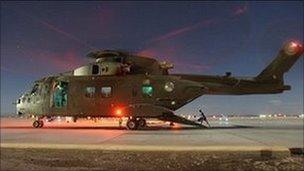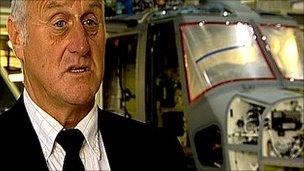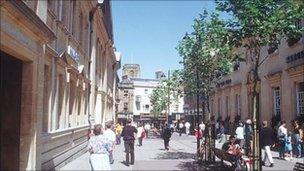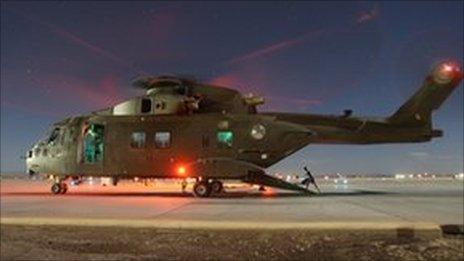UK GDP: The ups and downs of a Somerset helicopter town
- Published

Yeovil's economy is dominated by the AgustaWestland helicopter factory
As the latest numbers which detail the fragile health of the British economy are published, Joe Conway will be negotiating the redundancy deal for 375 workers at AgustaWestland, Somerset's famous helicopter factory.
Proof that the economy is sinking fast?
At the same moment across town, Ed Nicholson will be opening packing crates, moving into the new offices of his brand new hi-tech company.
Clear evidence that private business is leading the recovery?
No. Instead, the two men reflect what has been dubbed locally as "yoyo Yeovil".
The Somerset town captures the essence of the British economy, neither growing strongly nor declining rapidly but just "bumping along the bottom", as economists put it.
Highly skilled
But while entrepreneur Mr Nicholson is confident about prospects for his new start-up, union official Mr Conway is concerned about the impact of the job losses recently announced by factory managers.
"When Westland sneezes, everyone in Yeovil catches a cold," the Unite union official told me.
The impact of the defence cuts announced hundreds of miles away in Whitehall is being felt in Yeovil now. AgustaWestland have been hit by tighter MoD budgets, and falling demand for their helicopters.
Along with the job cuts at Westland's, as it is still known in Yeovil, BAE Systems announced 132 posts would go in the town, while at RNAS Yeovilton 120 staff will be made redundant by the Royal Navy.

"The redundancy notices will drop at Christmas", said Unite's Joe Conway
In total, more than 600 highly skilled engineering and IT jobs will disappear from one small town.
"The redundancy notices will drop at Christmas," Mr Conway said.
"There are suppliers across the district who rely on Westland, as well as the shops and pubs in the town whose trade comes from our workers."
Westland's problems also illustrate how interconnected the economy is. Ministers are insisting they need to cut spending on the public sector and rely on private companies to expand. But the main customers for AgustaWestland famous helicopters like the Lynx and the Merlin are the British Army and the Royal Navy.
It is a private company relying on public spending.
'Positives and negatives'
Mr Conway said: "This is proof that the government is cutting far too quickly. They need to keep spending money with British firms like Westland, or British jobs will go."
Yeovil's problem is that it relied too much on one big factory, which in turn relied too much on military contracts. AgustaWestland is aiming to change that now, launching a new helicopter for civilian buyers such as police forces. And in his own small way, Mr Nicholson is helping the town diversify too.
The 45-year-old served with the RAF for 17 years and worked at BAE Systems in the town before deciding to fly solo in the summer. He has now launched a small IT firm which provides small businesses with the kind of systems that, until recently, were only available to multinationals.

Despite the gloom, new businesses have launched in Yeovil this year
Appropriately enough for an ex-airman, his unique selling point is found in the "cloud". These are new, web-based, software solutions which companies do not install on their own machines. Instead, companies log on to a website which runs their accountancy, logistics, tracking or personnel needs.
He said: "Just two years ago, you would need to be a blue chip firm like BAE Systems to have this kind of IT firepower. Now we can offer it to a bunch of guys operating in a small office in Somerset."
Already his company has clients, including some ex-Marines who now offer anti-piracy security to global shipping firms. And the business centre he is moving into is home to half a dozen new start-ups, all full of confidence.
So which is the true picture of Yeovil? At the moment, both.
Jason Livingstone, an insurance broker who is vice-president of the local chamber of trade, said he sees positives and negatives every day.
"I can take you to a builder who is really struggling to get by and down the road there will be another builder who cannot keep up with the work," he said.
There are numbers to back up this impression. A recent survey by Business West, the West of England Chamber of Commerce, discovered substantially more firms had lost orders in the third quarter.
It also found the number of companies recruiting had dropped by a quarter, from 60% to 45%. Yet, when companies were asked about the future, 55% said they were "confident" or "very confident".
"Maybe that reflects the relentless optimism of business," Mr Livingstone told me with a smile.
"We have to believe we can do it, things will get better, or we'd never go to work in the morning."
- Published7 October 2011

